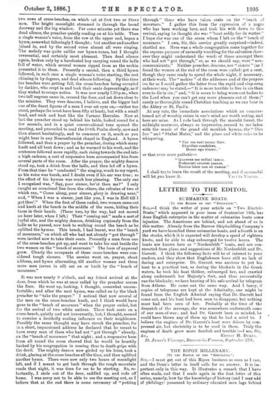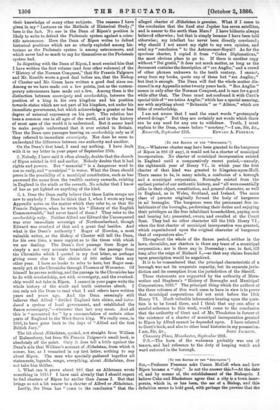THE RIPON MILLENARY.
[TO THE EDITOR OF THE "13PECTATOR."J
must get out of this Ripon business as soon as I can, and the Dean's letter in itself calls for no answer. It is im- portant only in this way. It illustrates a remark that I have often made, and that I made again in the first letter of this series, namely, how far the knowledge of history (and I may add of philology) possessed by ordinary educated men lags behind
their knowledge of many other subjects. The reasons I have given in my " Lectures on the Methods of Historical Study ;" here is the fact. No one in the Dean of Ripon's position is likely to write to defend the Ptolemaic system against a scien- tific astronomer. Here the Dean of Ripon writes to defend historical positions which are as utterly exploded among his- torians as the Ptolemaic system is among astronomers, and which never had so much to say for themselves as the Ptolemaic system had.
In disputing with the Dean of Ripon, I must remind him that I have written the first volume (and four other volumes) of the " History of the Norman Conquest," that Sir Francis Palgrave and Mr. Kemble wrote a good deal before me, that the Bishop of Chester and Mr. Green have written a good deal since me. Among us we have made out a few points, just as the contem- porary astronomers have made out a few. Among them is the distinction between sovereignty and overlordship, between the position of a king in his own kingdom and his position towards states which are not part of his kingdom, not under his immediate government, but which acknowledge a greater or less degree of external supremacy on his part. The relation has been a common one in all ages of the world, and in the history of most ages of the world it is understood. But it seems hard to make people understand that it ever existed in Britain. Thus the Dean uses passages bearing on overlordship only as if they referred to immediate sovereignty. Nor does he seem to understand the difference between one authority and another.
On the Dean's first head, I need say nothing. I have dealt with it in my letter in your paper of September 25th.
2. Nobody, I have said it often already, doubts that the church of Ripon existed in 661 and earlier. Nobody doubts that it had rights and powers. But " manorial " is a dangerous word to use so early, and " municipal " is worse. What the Dean should prove is the possibility of a municipal constitution, such as has answered the name from the twelfth century onwards, existing in England in the ninth or the seventh. No scholar that I know of has as yet lighted on anything of the kind.
3, 4. Does the Dean really believe that these Latin scraps are new to anybody ? Does he think that I, when I wrote my long Appendix notes on the matter which they refer to, or that Sir Francis Palgrave, when he wrote his "History of the English Commonwealth," had never beard of them ? They refer to the overlordship oaly. Neither Alfred nor Edward the Unconquered was ever immediate sovereign of Northumberland, though Edward was overlord of that and a great deal besides. And what is the Dean's authority ? Roger of Howden, a most valuable writer, as the Bishop of Chester will tell the Dean, for his own time, a mere copyist as to the times with which we are dealing. The Dean's first passage from Roger is simply a not very accurate translation of the passage from the Chronicles which I quoted in my first letter, as perhaps giving some clue to the choice of 866 rather than any other year. I have no books to refer to here, but Roger com- monly got at the Chronicles through Florence of Worcester. Of himself he prgves nothing, and the passage in the Chronicles has to do with overlordship, not with sovereignty, and the overlord. ship would not take in Ripon. I cannot in your pages write the whole history of the ninth and tenth centuries afresh. I can only ask the Dean to read what I and others have written years and years ago. And the Dean seemingly still believes that Alfred "divided England into shires, and intro- duced a system of local government, and established the Saxon sovereignty,"—whatever that last may mean. And all this is " accounted for by a commendation of certain other parts of England to the West-Saxon king. We really seem, in 1886, to have gone back to the days of "Alfred and the first British Jury."
The bit about zEthelstan, quoted, not straight from William of Malmesbury, but from Sir Francis Palgrave's small book, is absolutely off the point. Only it does tell a little against the Dean's si;le that William's account of iEthelstan, from which it comes, has, as I remarked in my first letter, nothing to say about Ripon. The man who specially gathered together all statements, legends, songs, everything, about iEthelstan, does not take him thither.
5. What can it prove about 886 that an Alderman wrote something in 1615 ? I have said already that I should expect to find charters of Ripon far earlier than James I. But that brings us not a bit nearer to a charter of Alfred or 2Ethelstan.
Lastly, the Dean has " come to the conclusion " that the
alleged charter of )Ethelstan is genuine. What if I come to the conclusion that the fixed star Jupiter has seven satellites, and is nearer to the earth than Mars ? I have hitherto always believed otherwise ; but that is simply because I have been told otherwise; my intellect has never been directly convinced ; why should I not assert my right to my own opinion, and send my " conclusion " to the Astronomer-Royal ? As for the spurious charter, I copied it from "Codex Diplomaticus," the most obvious place to go to. If there is another copy without " Dei grata," it does not much matter, as long as the document contains the description of " rex Anglia," and a crowd of other phrases unknown to the tenth century. I cannot, away from my books, quote any of these but " rex Anglia ;" but that is enough. The Dean will find the whole matter dis- cussed in my Appendix notes twenty years back. " Rex Angliaa comes in only after the Norman Conquest, and is rare for a good while after that. The Dean must not confound it with Cnut's special title of " rex totius Anglia," which has a special meaning,. nor with anything about " Britannia " or "Albion," which are titles of overlordship.
I am not aware that I used the exact words "grotesquely absurd doings." But they are certainly not words which there can be any need for any one to withdraw. Truth, I must explain to the Dean, comes before " courtesy."—I am, Sir, Sz.c.„



































 Previous page
Previous page